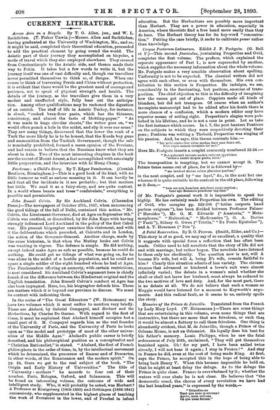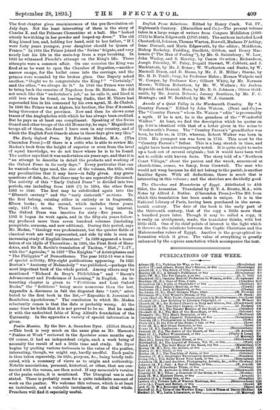Memoirs of the Prince de Joinville. Translated from the French
by Lady Mary Loyd. (W. Heinemann )—There are some things that are entertaining in this volume, even some things that are instructive, but there are more that are frivolous, or such that it would be almost a flattery to call them frivolous. One thing is abundantly evident, that M. de Joinville, though a Prince of the Orleans House, is not an Orleanist. He loyally does his best for his father's memory. Louis Philippe, when he saw the fatal ordonnance,s of July 20th, exclaimed, "They will get themselves banished again. Oh ! for my part, I have been exiled twice already, I will not bear it again; I stay in France ! " And stay in France he did, even at the cost of being made King. At first, says the Prince, he accepted this in the hope of being able to bring back Henry V. When this became impossible he held on, that he might at least delay the deluge. As to the deluge the Prince is quite clear. France is overwhelmed by it; whether the waters will ever abate he is not clear. He believes that "the democratic creed, the chorus of every revolution we have had the last hundred years," is expressed by the words,—
"Thimoliss3ns Tent one DOLL, pourrous I Aprea, noes verrons ale que noes fermis."
The first chapter gives reminiscences of the pre-Revolution.of- July days. Not the least interesting of them is the story of Charles X. and the Princess Clementine at a ball. She " looked utterly bewitching in her powder and looped-up dress." The old King kissed her, and, holding her hand, said to her father, " If I were forty years younger, your daughter should be Queen of France." In 1834 the Prince joined the ` Sirens' frigate, and very nearly lost his life in the main-top from a rope breaking. In 1835 he witnessed Fieschi's attempt on the King's life. These attempts were a common affair. On one occasion the King was fired at as he went to open the Chamber of Deputies,—another narrow escape, for the bullet came into the carriage, and the princes were wounded by the broken glass. One Deputy asked another, "Ought we to congratulate the King ? " "Certainly," said the other, "we always do it." In 1840 the Prince was sent to bring back the remains of Napoleon from St. Helena. He did not much like this " undertaker's job," as he calls it, and liked it still less when he found, on leaving Cadiz, that M. Thiers had superseded him in his command by his own agent, M. de Chabot. In 1848 the Prince was at Algiers, his brother, the Dac d'Aumale, being Governor of the province. Now and then he shows some traces of the Anglophobia with which he has always been credited. But he pays us at least one compliment. Speaking of the Swiss Guard and other troops of the old Monarchy, he says, " Magnificent troops all of them, the finest I have seen in any country, and of which the English Foot Guards alone in these days give any idea."







































 Previous page
Previous page